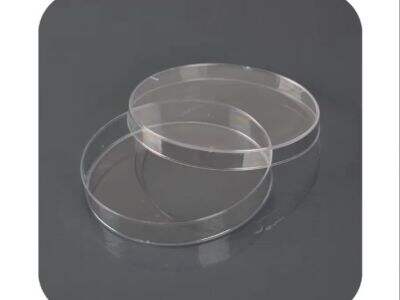पेट्री डिशहरू वैज्ञानिकहरूले बैक्टीरिया भन्दा छोटो जीवहरू विकसित गर्न खप्त गर्ने राम्रो उपकरणहरू हुन्। त्यहाँ या तो ग्लास वा प्लास्टिक बनाएको गोल डिशहरू हुन्। आज, हामी पोलिस्टाय्रीन (जसलाई तपाईंले धेरै पनि देख्न सक्नुहुन्छ) र ग्लास पेट्री डिशहरूको फाइदाहरू र दोषहरू बारेमा चर्चा गर्नेछौ।
ग्लास पेट्री डिश
ग्लास पेट्री डिश कोटा प्रकारको ग्लासले बनाइएको छ, जसले स्पष्टतः, देखाउने र चमकीलो हुन्छ। तिनि प्लास्टिकबाट बनाएका पेट्री डिशभन्दा थप खर्च आउन सक्छन्, तर तीहरू केही महान फायदाहरू प्रदान गर्दछन् जसले सबैको माथी लाग्छ।
ग्लास पेट्री डिशको सर्वश्रेष्ठ भागहरूमध्ये एक यो हो कि तिनीहरूलाई पुन: प्रयोग गर्न सकिन्छ। तिनीहरूमा तपाईंको जीवाणुहरू विकास गराउने, सुस्तै धुने र पुन: उपयोग गर्ने। यो पृथ्वीलाई अत्यन्त महत्वपूर्ण हो, किनकि यो प्लास्टिक अपशिष्टको कमीमा मद्दत गरिरहेको छ। चीजहरू पुन: प्रयोग गर्न वातावरणको लागि राम्रो हो र यो अर्थात् सफा, स्वस्थ ग्रह।
ग्लास पेट्री डिशहरू पनि बहुत मजबूत छन् र काफी समय लाग्छन्। ग्लास पेट्री डिश वैज्ञानिकहरूमध्ये आम छन्, तिनीहरूले जान्छन् कि तिनीहरू तेजीमा टूट्दैनन्। अर्थात्, तिनीहरूले तिनीहरूलाई आफ्ना प्रयोगहरू रक्षा गर्न र परिणामहरू मिश्रित न हुने गर्दछन्।
प्लास्टिक पेट्री डिश
तर, प्लास्टिक पेट्री डिशहरू स्पष्ट तरीकाले बनाइएका छन् तर फ़िमी मालिका बाट। तर तिनीहरू आम तौरमा ग्लास पेट्री डिशभन्दा थप लाग्ने खर्च छैन र पीसीआर प्लेट डाकुमेन्टरी उपयोगी-कार्यहरू पनि दिन सक्छ।
हामी जबरजस्तीमा प्रयोग गर्ने हो भने, त्यो स्पष्ट प्लास्टिक पेट्री डिशलाई अटोक्लेवमा फेलाएर स्टेरिलाइज गरिएको छ र पुनः प्रयोग गर्न ठूल्लो हुन्छ। यी पश्चात् बैक्टीरिया कल्चर गर्न उपयोग गरिएपछि फेक्दा सकिन्छ। यसले कोड आधारलाई अत्यधिक सफा राख्दछ र उनीहरूको उत्पादकतालाई बढाउदै छ जसले यसको अभ्यास गर्न चाहन्छन्। यो समय बचाउने समाधानलाई अधिक अन्वेषण गर्न चाहिन्छ कि के हाम्रा अधिकांश ग्राहकहरूले अपनो माछुआनी खर्ची र अवास्तविक थालहरूमा चाहन्छन्।
म यसलाई पोस्ट गर्दछु भनेर एउटा और कारण हो कि यो कति उपयोगी हुन सक्छ र तपाईंलाई यसैगरी प्लास्टिक पेट्री डिशहरू अति स्टैकेबल र पैकेबल पनि हुन्छ। यी साथै अति हल्का छन्, त्यसैले तपाईं यी ढाक्न सक्नुहुन्छ र यी लोहा को ठोस ब्लॉकमा बदलिनन्। यो लेबमा वा क्लासरूम सेटिङ्गमा सैम्पलहरू आयोजित र सदैव साथमा राख्न अति सुविधाजनक छ।
ग्लास पेट्री डिश प्रयोग गर्ने फाइदाहरू
तीन बार काँच पेट्री डिशहरूलाई प्रयोग गर्ने र फेरि गर्ने जनाउँदा। अब, यसले अपशिष्टको दृष्टिलाई माथी राखेर पर्यावरणको लागि राम्रो हुन्छ, तर यदि तपाईं यसबारे सोच्नु भएको छ, यसले पनि पैसा बचाउँछ। वैज्ञानिकहरूले अपना बजेटमा पैसा बचाउन सक्छन् (डिशहरू खरीद्न थाहै)।
काँच पेट्री डिश प्लास्टिक_पेट्री_डिशभन्दा कम स्क्रेच हुने संभावना छ, त्यसोले यसलाई फरक पार्दछ। थप्पी स्क्रेचहरू पनि बैक्टीरिया राख्ने माइक्रो-केविटीहरू बनाउन सक्छ जुन प्रयोगहरूमा गहिरै अवरोध गर्दछ र अन्ततः परिणामहरूलाई अविश्वसनीय बनाउँदछ। काँच डिशहरूले वैज्ञानिकहरूलाई यस बारे निश्चित गर्न दिन्छ कि तिनीहरूका प्रयोगमा कुनै समस्या हुनेछैन।
प्लास्टिक पेट्री डिश प्रयोग गर्ने कारणहरू
जब प्रयोगहरूमा उच्च सफाई र स्टेरिलिटीको आवश्यकता पर्थ्यो, हामी प्लास्टिक पेट्री डिश प्रयोग गर्थ्यौं र Vacutainer tube । यसरी प्रयोग पछाडि यसलाई फेल्न सकिन्छ जसले एक प्रयोगबाट अर्कोमा बैक्टीरिया मिश्रित नहुन पार्दछ। वैज्ञानिकहरूको लागि, यो सटीकता र शुद्धतामा अति महत्वपूर्ण छ।
मैले कठिन रास्तोले सिकाइयो, जब मैले अटोक्लेविंग पर्दै पछि पेट्री डिशहरू संक्षेपण गर्न भूलभयो (प्लास्टिक पेट्री डिशहरू साधारण गर्मी-सिलिङ्गको अलावा स्टेरिल रूपमा पनि आउँदछ)। यसै रास्तै, जब वैज्ञानिकले एक उपयोग गर्न तयार हुन्छ, तिनी त्योको नजिकै फिट तोड्न सक्छन् जसले तिनीको नमूना वा प्रयोगको साथै चिन्ता बिना गर्न सक्छ कि जीवाणुहरू उपस्थित छन्।
दुवै दुनियाको सर्वश्रेष्ठ
ग्लास र प्लास्टिक पेट्री डिशहरूमा विशेष गुणहरू हुन सक्छन् जसले तपाईंको अनुसंधानको लागि एक अरू भन्दा अनुकूल बनाउँदछ, र कुन ठाउँमा? मैले ग्लास पेट्री डिशहरूलाई सोच्यो किनकि तिनी स्थिर छन् तथा पुन: धुन सकिन्छ जुन अरू रूपमा वातावरणमिति बन्द हुन सक्छ। त्यसैले विपरीत रूपमा प्लास्टिक पेट्री डिशहरू राम्रो छन्, तिनी उपयोग गर्दै पछि फेंक्न सकिन्छ र डिस्पोजल साधारण छ।
केंगवे मेडिकल को अलग ग्लास र प्लास्टिक पेट्री डिश बॉरलहरू सँगै, अभ्यासको दुनियामा जान्छौ। तपाईंले तपाइँको पेट्री डिशमा ग्लासको थाहिरतामा वा प्लास्टिकको सुविधामा फरक गर्न सक्नुहुन्छ। ठिक छ, तपाईंको बैक्टीरिया हरूलाई बढाउनुहोस्, र हामी तपाईंको लागि शुरुवातका सामग्रीहरूसँग यहाँछौ।
 EN
EN
 AR
AR
 BG
BG
 HR
HR
 CS
CS
 DA
DA
 NL
NL
 FI
FI
 FR
FR
 DE
DE
 EL
EL
 HI
HI
 IT
IT
 JA
JA
 KO
KO
 NO
NO
 PL
PL
 PT
PT
 RO
RO
 RU
RU
 ES
ES
 SV
SV
 TL
TL
 ID
ID
 SR
SR
 UK
UK
 VI
VI
 HU
HU
 TH
TH
 TR
TR
 AF
AF
 MS
MS
 BE
BE
 IS
IS
 KA
KA
 BN
BN
 NE
NE
 MY
MY
 KK
KK
 UZ
UZ

